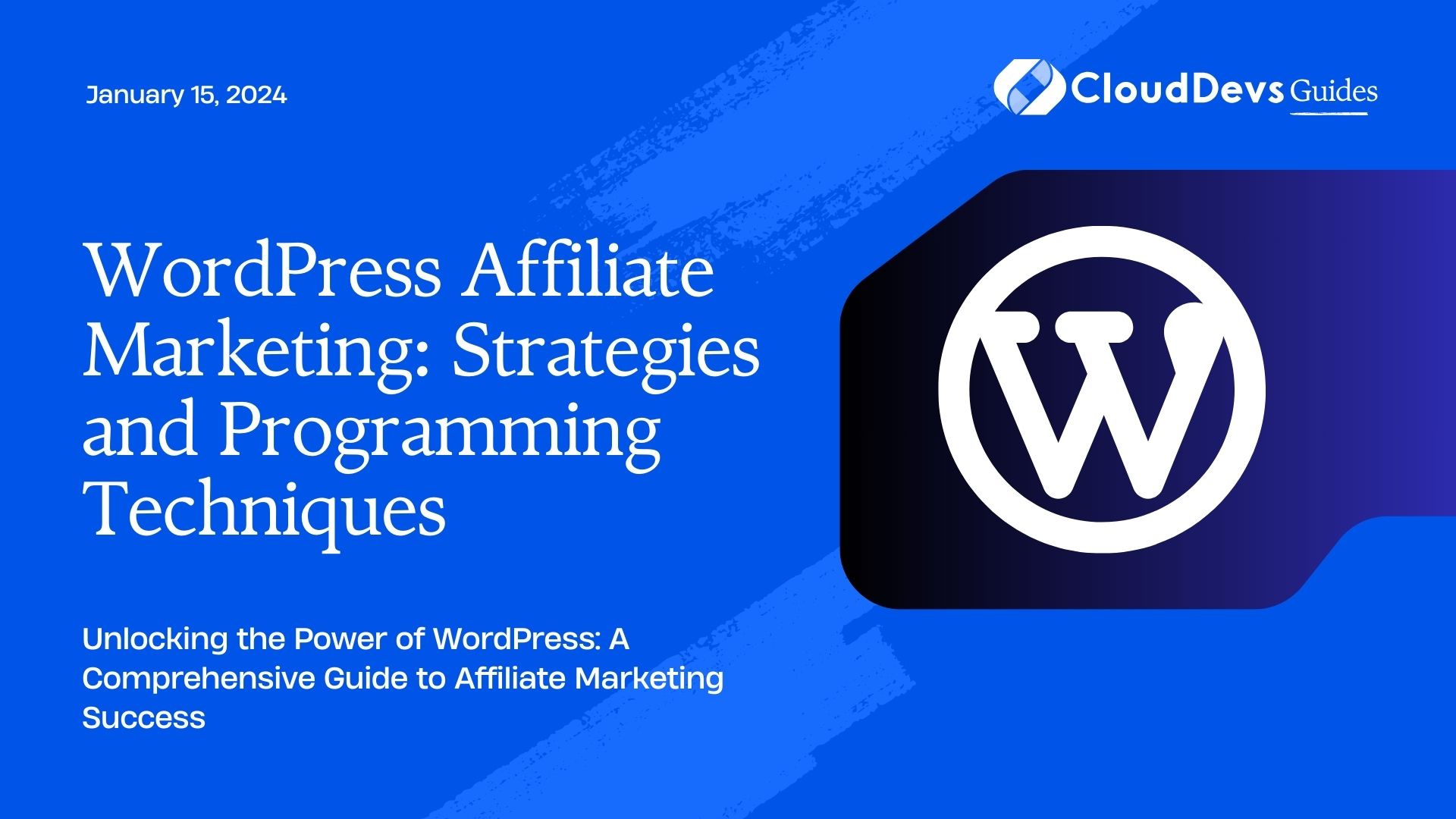WordPress Affiliate Marketing: Strategies and Programming Techniques
Affiliate marketing is a powerful way to monetize your WordPress website. By promoting products or services from other companies, you can earn commissions on sales generated through your affiliate links. In this comprehensive guide, we’ll explore effective strategies and programming techniques to help you maximize your affiliate marketing efforts on WordPress.

Table of Contents
1. Understanding Affiliate Marketing
1.1. What is Affiliate Marketing?
Affiliate marketing is a performance-based marketing strategy where individuals or businesses promote products or services and earn a commission for every sale or action made through their unique affiliate links. It’s a win-win situation: businesses gain more exposure and customers, while affiliates earn passive income.
1.2. Why WordPress for Affiliate Marketing?
WordPress is a popular choice for affiliate marketers due to its flexibility, user-friendliness, and vast plugin ecosystem. Whether you’re a seasoned affiliate marketer or just starting, WordPress offers the tools and features needed to succeed.
2. Affiliate Marketing Strategies
2.1. Niche Selection
Successful affiliate marketing begins with selecting the right niche. Choose a niche you’re passionate about and one with a target audience that’s large enough to generate substantial income.
2.2. Keyword Research
Keyword research is crucial for SEO optimization. Tools like Google Keyword Planner and SEMrush can help you identify relevant keywords and phrases to target in your content.
2.3. Quality Content
Create high-quality, informative, and engaging content that resonates with your target audience. Write product reviews, tutorials, and articles that address their pain points and needs.
2.4. Email Marketing
Build an email list to nurture relationships with your audience. Send regular newsletters with affiliate offers, exclusive deals, and valuable content to encourage conversions.
2.5. Social Media Promotion
Utilize social media platforms to share your affiliate links and engage with your audience. Platforms like Instagram and Pinterest are particularly effective for visual product promotions.
2.6. YouTube and Video Marketing
Create video content to showcase products or demonstrate their use. YouTube is a powerful platform for affiliate marketing, with the potential for high visibility and engagement.
3. WordPress Affiliate Marketing Plugins
WordPress offers a plethora of plugins to enhance your affiliate marketing efforts. Here are some essential ones:
3.1. ThirstyAffiliates
ThirstyAffiliates is a popular affiliate link management plugin. It allows you to cloak affiliate links, insert them into posts easily, and track their performance.
php // Example of how to use ThirstyAffiliates shortcode [thirstylink id="1" linktext="Visit Product X"]
3.2. Pretty Links
Pretty Links is another URL shortening and link management plugin. It helps you create clean, branded, and memorable affiliate links.
php // Example of how to create a Pretty Link PrettyLink::create( 'https://yourwebsite.com/recommends/product-x', 'product-x-affiliate-link' );
3.3. AffiliateWP
AffiliateWP is a comprehensive affiliate marketing plugin for WordPress. It offers advanced features like real-time affiliate tracking, affiliate management, and detailed reporting.
php
// Example of how to track affiliate sales with AffiliateWP
if ( function_exists( 'affiliate_wp' ) ) {
affiliate_wp()->tracking->record_visit();
affiliate_wp()->tracking->maybe_set_affiliate( $affiliate_id );
affiliate_wp()->tracking->visit( $affiliate_id );
}
3.4. WooCommerce
If you’re running an e-commerce store on WordPress, WooCommerce can be your best friend for affiliate marketing. It integrates seamlessly with many affiliate plugins.
php
// Example of how to integrate WooCommerce with an affiliate plugin
add_action( 'woocommerce_checkout_order_processed', 'record_affiliate_sale' );
function record_affiliate_sale( $order_id ) {
// Your code to record the affiliate sale here
}
4. Programming Techniques for Affiliate Marketing
To take your affiliate marketing game to the next level, consider implementing these programming techniques:
4.1. Custom Landing Pages
Create custom landing pages for your affiliate products. These pages can be highly optimized for conversions and tailored to the specific needs of your audience.
php // Example of creating a custom landing page template in WordPress <?php /* Template Name: Custom Landing Page */ // Your custom landing page code here ?>
4.2. A/B Testing
Implement A/B testing to optimize your affiliate marketing campaigns. Tools like Google Optimize can help you experiment with different elements to improve conversion rates.
html
<!-- Example of A/B testing code snippet -->
<script src="https://www.googleoptimize.com/optimize.js"></script>
<script>
ga('create', 'YOUR-EXPERIMENT-ID', 'auto');
ga('send', 'pageview');
</script>
4.3. Data Analytics
Utilize data analytics tools like Google Analytics and heatmaps to gain insights into user behavior. Identify areas where users drop off and make necessary improvements.
javascript
// Example of Google Analytics event tracking code
gtag('event', 'affiliate_click', {
'event_category': 'Affiliate Marketing',
'event_label': 'Product X',
'value': 1
});
4.4. User-generated Content
Encourage user-generated content, such as reviews and testimonials, to build trust and credibility with your audience. Implement a commenting system and showcase user feedback.
php
// Example of a basic WordPress comment loop
<?php
if ( have_comments() ) {
wp_list_comments();
}
?>
5. Compliance and Legal Considerations
5.1. Disclosure
To maintain transparency and comply with regulations, disclose your affiliate relationships clearly in your content. Use clear language and place disclosures prominently.
html <!-- Example of an affiliate disclosure statement --> <p>Disclosure: This post may contain affiliate links. If you click through and make a purchase, I may receive a commission (at no additional cost to you).</p>
5.2. GDPR and Privacy
If you have a global audience, ensure compliance with data protection regulations like GDPR. Implement a privacy policy and seek consent for data collection where necessary.
html <!-- Example of a GDPR consent banner --> <div id="gdpr-consent-banner"> <!-- Your consent message and options here --> </div>
6. Tracking and Optimization
6.1. Performance Tracking
Regularly monitor the performance of your affiliate marketing campaigns. Analyze data to identify what’s working and what needs improvement.
6.2. Conversion Rate Optimization (CRO)
Implement CRO techniques to improve the conversion rates of your affiliate links. Test different call-to-action buttons, placements, and content strategies.
Conclusion
WordPress affiliate marketing offers an excellent opportunity to generate passive income and monetize your website. By implementing effective strategies and utilizing the right plugins and programming techniques, you can maximize your affiliate marketing efforts. Remember to stay compliant with legal regulations and consistently track and optimize your campaigns for long-term success.
Start your affiliate marketing journey on WordPress today and watch your income grow as you connect your audience with valuable products and services.
Affiliate marketing can be a highly rewarding endeavor when done right. With the power of WordPress and these strategies and programming techniques, you can turn your website into a revenue-generating machine. Get started today and embark on your path to affiliate marketing success.
Remember, success in affiliate marketing often takes time and persistence. Keep refining your strategies, testing new approaches, and staying up-to-date with industry trends to stay ahead of the competition.
Ready to boost your affiliate income? Dive into WordPress affiliate marketing and unlock its full potential!
Table of Contents







